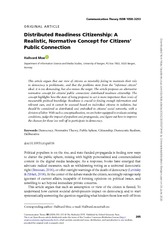Distributed Readiness Citizenship: A Realistic, Normative Concept for Citizens’ Public Connection
Peer reviewed, Journal article
Published version

Åpne
Permanent lenke
http://hdl.handle.net/1956/23098Utgivelsesdato
2020Metadata
Vis full innførselSamlinger
Originalversjon
https://doi.org/10.1093/ct/qtz016Sammendrag
This article argues that our view of citizens as miserably failing to maintain their role in democracy is problematic, and that the problems stem from the “informed citizen” ideal: it is too demanding, but also misses the target. The article proposes an alternative normative concept for citizens’ public connection: distributed readiness citizenship. The concept highlights how the state of being prepared to act is more important than levels of measurable political knowledge. Readiness is crucial to finding enough information and relevant cues, and it cannot be assessed based on individual citizens in isolation, but should be considered as distributed, and embodied in citizens’ social networks, with a division of labor. With such a conceptualization, we are better equipped to evaluate existing conditions, judge the impact of populism and propaganda, and figure out how to improve the chances for those less well-off to participate in democracy.
